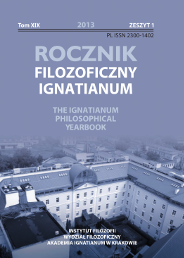Ateistyczne nurty filozofii Oświecenia. Wpływ skrajnego materializmu i racjonalizmu
Abstract
Przyjęcie racjonalizmu, połączonego ze skrajnym materializmem i sensualizmem, umożliwiło rozwój oświeceniowego ateizmu, który jednak był jednym z nurtów funkcjonujących w tym, krytycznym wobec dotychczasowej kultury europejskiej, okresie. Artykuł zwraca uwagę na kilka czołowych idei oświeceniowego racjonalizmu, które na zawsze zmieniły europejską filozofię. Uczynienie ludzkiego rozumu nową podstawą autorytetu oraz krytyka wszystkich teorii opierających się jedynie na autorytecie i tradycji, przede wszystkim religijnych, stały się nowym punktem wyjścia.
Literaturhinweise
Behrens CBA (1985), "Society, Government and the Enlightenment. The experiences of eighteenth --- century France and Prussia" New York Harper and Row.
Buckley MJ (2009), "Ateizm w sporze z religią" Kraków Wydawnictwo WAM.
Copleston F (1996), "Historia filozofii" Warszawa Vol. VI Wydawnictwo PAX.
Delon M (1995), "Réhabilitation des préjugés et crise des Lumières", In La Crise des Lumières. Paris (3), pp. 143-156.
Fabro C (1964), "Introduzione all'ateismo moderno" Roma Studium.
Hazard P (1974), "Kryzys świadomości europejskiej 1680--1715" Warszawa Państwowy Instytut Wydawniczy.
Hazard P (1972), "Myśl europejska w XVIII wieku od Monteskiusza do Lessinga" Warszawa Państwowy Instytut Naukowy.
Rocznik przyjmuje do druku wyłącznie materiały, które nie wchodzą w żaden konflikt interesów, żaden konflikt z prawem autorskim itp. Redakcja prowadzi działania przeciw: plagiatom, ghostwriting1, guest/honorary authorship2 itp. Autor pracy zbiorowej, który jest pierwszy na liście, bierze na siebie odpowiedzialność i ma obowiązek przedstawić wkład wszystkich współautorów. Jeśli publikacja powstała dzięki dedykowanym środkom finansowym, należy ujawnić to np. w Podziękowaniu, przypisie itp. Ew. przedruki wymagają jawnego zgłoszenia i okazania odpowiedniego pozwolenia wydawniczego. Autorzy / Recenzenci nierzetelni narażają się na reakcję właściwą stosownym instytucjom.
______
1 Ma to miejsce, gdy osoba mająca istotny wkład jest pominięta na liście Autorów czy w Podziękowaniu.
2 Zachodzi, gdy na liście autorskiej pojawia się osoba mająca znikomy/żaden udział w pracy.





